

Introduction to Censorship. Censorship. Censorship Censorship is the suppression of ideas and information that certain persons—individuals, groups or government officials—find objectionable or dangerous.
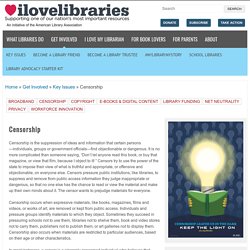
It is no more complicated than someone saying, “Don’t let anyone read this book, or buy that magazine, or view that film, because I object to it! ” Censors try to use the power of the state to impose their view of what is truthful and appropriate, or offensive and objectionable, on everyone else. Censors pressure public institutions, like libraries, to suppress and remove from public access information they judge inappropriate or dangerous, so that no one else has the chance to read or view the material and make up their own minds about it. The censor wants to prejudge materials for everyone.
The First Amendment in Schools: Censorship - NCAC. Introduction | The First Amendment and Public Schools | Censorship | Student Protest Rights | How Big a Problem is Censorship?
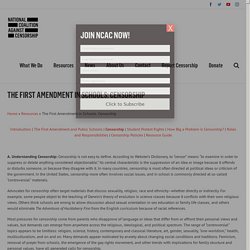
| Roles and Responsibilities | Censorship Policies | Resource Guide A. Understanding Censorship: Censorship is not easy to define. According to Webster’s Dictionary, to “censor” means “to examine in order to suppress or delete anything considered objectionable.” Its central characteristic is the suppression of an idea or image because it offends or disturbs someone, or because they disagree with it. Censorship by the Numbers 2019 - ALA OIF. About Banned & Challenged Books - ALA. Does ALA ban books?
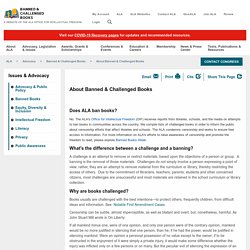
No. The ALA's Office for Intellectual Freedom (OIF) receives reports from libraries, schools, and the media on attempts to ban books in communities across the country. We compile lists of challenged books in order to inform the public about censorship efforts that affect libraries and schools. The ALA condemns censorship and works to ensure free access to information. For more information on ALA's efforts to raise awareness of censorship and promote the freedom to read, please explore Banned Books Week.
What's the difference between a challenge and a banning? A challenge is an attempt to remove or restrict materials, based upon the objections of a person or group. Why are books challenged? Books usually are challenged with the best intentions—to protect others, frequently children, from difficult ideas and information. The First Amendment Encyclopedia. Book banning, the most widespread form of censorship, occurs when private individuals, government officials, or organizations remove books from libraries, school reading lists, or bookstore shelves because they object to their content, ideas, or themes.
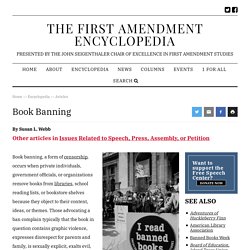
Those advocating a ban complain typically that the book in question contains graphic violence, expresses disrespect for parents and family, is sexually explicit, exalts evil, lacks literary merit, is unsuitable for a particular age group, or includes offensive language. In this photo, Gail Sheehy, author of "Passages," at podium, right, reads during the "First Banned Books Read Out" in New York, April 1, 1982. The rally protested censorship by school and public libraries of certain books under pressure from right wing religious groups. (AP Photo/Carlos Rene Perez, used with permission from the Associated Press) Book banning is the most widespread form of censorship in the United States. Internet Filtering: An Interpretation of the Library Bill of Rights - ALA. In the span of a single generation, the Internet has revolutionized the basic functions and operations of libraries and schools and expanded exponentially both the opportunities and challenges these institutions face in serving their users.
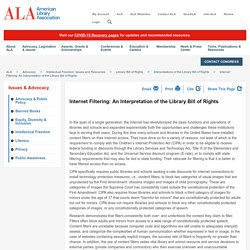
During this time many schools and libraries in the United States have installed content filters on their Internet access. They have done so for a variety of reasons, not least of which is the requirement to comply with the Children’s Internet Protection Act (CIPA) in order to be eligible to receive federal funding or discounts through the Library Services and Technology Act, Title III of the Elementary and Secondary Education Act, and the Universal Service discount program (E-rate), or to comply with state filtering requirements that may also be tied to state funding.
Their rationale for filtering is that it is better to have filtered access than no access. This same situation also occurs in schools. 1 Kristen R. 2 United States v. See Also. Online Censorship in the States - ACLU. In a sweeping victory for free speech rights in cyberspace, the Supreme Court struck down the Communications Decency Act in Reno v.
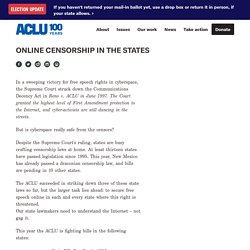
ACLU in June 1997. The Court granted the highest level of First Amendment protection to the Internet, and cyber-activists are still dancing in the streets. But is cyberspace really safe from the censors? Despite the Supreme Court's ruling, states are busy crafting censorship laws at home. At least thirteen states have passed legislation since 1995.